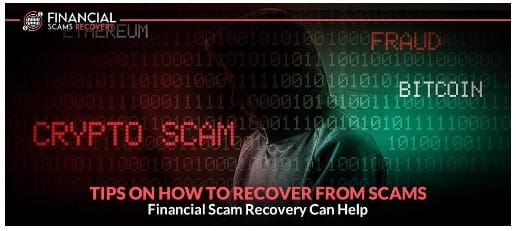Have you ever received a call, email, or text message claiming you owe unexpected taxes on a recent withdrawal? If you said yes, you may be the target of a withdrawal tax scam. These scams can be incredibly stressful and confusing, leaving victims feeling helpless. But fear not, Financial Scam Recovery is here to help!
Financial Scam Recovery: Your Champion Against Financial Fraud
Financial scams are a multi-billion dollar industry, and withdrawal tax scams are unfortunately a prevalent tactic. Here at Financial Scam Recovery, we understand the emotional and financial toll these scams can take. We are a team of dedicated professionals with years of experience in helping victims recover from financial fraud of all kinds. We have a proven track record of success in:
- Identifying and understanding the specific tactics used in withdrawal tax scams.
- Aggressively pursuing the return of your lost funds.
- Guiding you through the legal and communication processes.
Providing emotional support and helping you regain control of your financial situation.

Types of Withdrawal Tax Scams
While withdrawal tax scams share common tactics, they can vary depending on the situation. Here’s a closer look at some prevalent variations:
- IRA Withdrawal Scam: Scammers may target individuals nearing retirement age, claiming they owe unexpected taxes on their IRA withdrawal. They may pressure victims into transferring funds to a “secure” account controlled by the scammer, supposedly to settle the supposed tax debt.
- Investment Account Withdrawal Scam: This scam can target investors looking to withdraw funds from a brokerage account. Scammers may pose as investment advisors or platform representatives, insisting on immediate tax payments before the withdrawal can be processed.
- Lottery Winnings Scam: This scam preys on the excitement of winning a lottery. Scammers may contact “winners” demanding upfront payment of “taxes” or “processing fees” before they can receive their winnings. Remember, legitimate lotteries never require upfront payments from winners.
- Tax Refund Scam (with a Twist): A more complex twist on the traditional tax refund scam involves claiming you owe taxes on a non-existent refund. The scammer may fabricate documents or reference a fake tax ID number to create a sense of legitimacy.
These are just a few examples, and scammers are constantly developing new tactics. It’s important to be vigilant and aware of any unexpected contact claiming tax obligations on withdrawals.

How to Protect Yourself from Withdrawal Tax Scams
Knowledge is power when it comes to protecting yourself from withdrawal tax scams. Here are some actionable steps you can take:
- Verify the Source: Never respond to unsolicited emails, texts, or calls claiming you owe taxes. The IRS and other legitimate government agencies will typically initiate contact through mail or secure online portals.
- Know the IRS’s Procedures: The IRS will never demand immediate payment over the phone or threaten arrest. They will typically send you a letter outlining any tax debt and provide instructions on how to resolve it through official channels.
- Don’t Give Out Personal Information: Legitimate tax authorities already have your tax information on file. Never share your Social Security number, bank account details, or other sensitive information over the phone or email.
- Beware of Urgency: Scammers often try to create a sense of urgency to pressure victims into making rash decisions. Take a step back, verify the information, and don’t be afraid to hang up the phone or delete an email.
- Use Secure Communication: If you’re unsure about the legitimacy of a communication, contact the IRS or your financial institution directly using verified phone numbers or websites.
By following these tips and staying informed, you can significantly reduce your risk of falling victim to a withdrawal tax scam.

What to Do If You’ve Been Scammed
Unfortunately, even the most cautious individuals can be targeted by scams. If you have been scammed, it’s important to act quickly to minimize the damage. Here’s what you should do:
- Stop Communication: Don’t respond to any further attempts at contact from the scammers.
- Report the Scam: File a report with the Federal Trade Commission (FTC) at https://reportfraud.ftc.gov/. Reporting scams helps authorities track fraudulent activity and potentially recover funds for victims.
- Contact the IRS: Report the scam to the IRS if you believe your identity has been stolen or used to file a fraudulent tax return. The IRS has a dedicated phone line for reporting tax scams: 1-800-829-1040.
- Contact Your Financial Institution: Alert your bank or credit card company about the scam. They may be able to help you recover lost funds, especially if the withdrawal was unauthorized.
- Consider a Credit Freeze: If you believe your identity has been compromised, consider placing a freeze on your credit report with all three major credit bureaus: Equifax, Experian, and TransUnion. This will help prevent scammers from opening new accounts in your name.
- Seek Help: Don’t be afraid to seek professional help. Financial Scam Recovery can assist you in navigating the recovery process and pursuing legal action against the scammers if applicable.
By taking these steps, you can start the process of recovering from a withdrawal tax scam and protect yourself from future financial fraud.
Remember, Financial Scam Recovery is here to help you every step of the way.
We understand the emotional and financial toll of these scams, and we are committed to fighting for your rights. Contact us today for a free consultation.
Understanding Withdrawal Tax Scams
Withdrawal tax scams come in various forms, but they all share a common goal: to trick you into parting with your hard-earned money. Here are some of the most common red flags:
- Urgency and Pressure: Scammers often create a sense of urgency by claiming you owe immediate tax payments or face penalties.
- Threats and Intimidation: They may threaten legal action, arrest, or deportation if you don’t comply with their demands.
- Unfamiliar Contact Methods: They may contact you via phone, email, or text message, often impersonating legitimate government agencies like the IRS.
- Unconventional Payment Methods: They may demand payment through gift cards, prepaid debit cards, or wire transfers – methods never used by the IRS for legitimate tax collection.
- Vague or Non-Existent Documentation: They may be unable to provide clear documentation of the alleged tax debt or have inconsistencies in the information they provide.
If you encounter any of these red flags, it’s crucial to stop communication immediately and not make any payments.
How Financial Scam Recovery Can Help You Fight Back
Here’s how Financial Scam Recovery can assist you if you’ve been targeted by a withdrawal tax scam:
- Free Consultation: We offer a free, no-obligation consultation to assess your unique situation and discuss your options.
- Evidence Collection: We’ll work with you to gather evidence of the scam, including emails, text messages, and call records.
- Communication with Scammers: In some cases, we may initiate contact with the scammers to expose their tactics and potentially retrieve information.
- Contacting Financial Institutions: We’ll contact your bank or financial institution to report the scam and help you recover any funds that may have been withdrawn.
- Law Enforcement Liaison: If necessary, we can connect you with law enforcement agencies to report the scam and assist with their investigation.
- Credit Monitoring: If your identity has been compromised, we can help you monitor your credit report and protect yourself from future fraud.
Taking Action is Key
The sooner you act after encountering a withdrawal tax scam, the better your chances of recovering your lost funds. Scammers often rely on fear and confusion to pressure victims into making hasty decisions. If you’ve been contacted, don’t panic. Don’t respond or make any payments.
Contact Financial Scam Recovery Today
Financial Scam Recovery can empower you to take back control and fight back against withdrawal tax scams. We’ll work tirelessly to help you:
- Recover stolen funds
- Expose the scammers
- Protect your future financial security
- Regain peace of mind
Contact us today for a free consultation. Remember, you are not alone. Financial Scam Recovery is here to help.
ThePrint BrandStand content is a paid-for, sponsored article. Journalists of ThePrint are not involved in reporting or writing it.

